Student, Prague Spring. Mixed Media by listed Scottish artist Thora Clyne, 1969
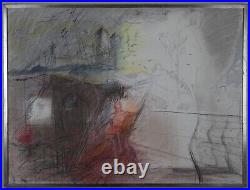
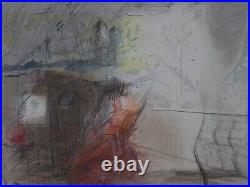
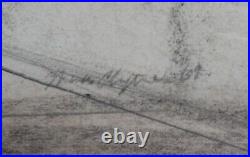
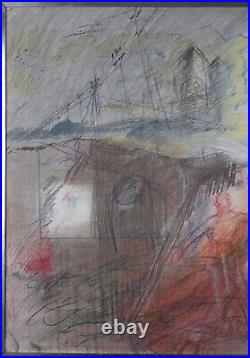
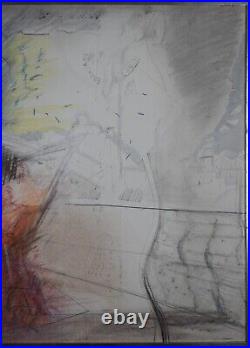
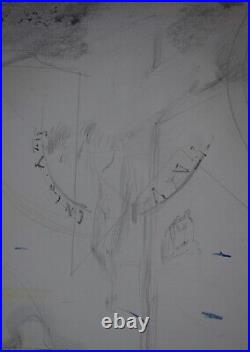
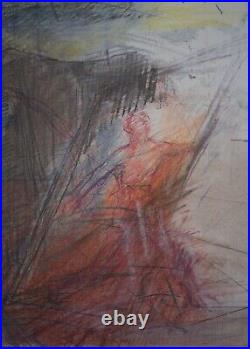
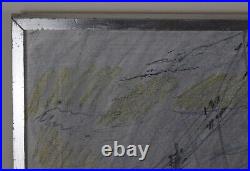

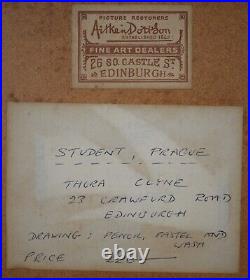
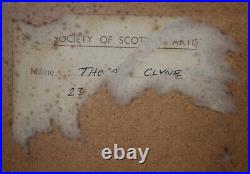

Well painted and striking original expressionist mixed media work by the listed Scottish artist Thora Clyne (1937 - 2020) painted in 1969. Titled "Student, Prague", this work is Clyne's emotional reaction to the Czechoslovakian Prague Spring revolution of 1968, specifically the role of the student Jan Palach. The central red figure is Palach (literally a man on fire) coming through a doorway into the light, above right in pencil is the face of the famous Prague Astronomical Clock, superimposed over the outline of Christ Crucified (self sacrifice) - it is a painting laden with symbolism and emotion. At this time Clyne was lecturing her students at Edinburgh College of Art and clearly was deeply affected by Palach's sacrifice - this work stands apart from the rest of her oeuvre. Signed lower right and dated'69, with the artist's original label verso giving the title and further details and a fragment of the exhibition label from the Society of Scottish Artists.
Pencil, pastels and watercolour wash on wove paper, in the original silver gilt wood frame. Painting in excellent original condition. The frame has some nicks and scratches (see photos).
Image 57cm by 76.5cm. Frame 60.5cm by 80cm.
Comes with our Certificate of Authenticity - guaranteed authentic and original. Thora Clyne SSWA 1937 - 2020. Scottish painter in oils & watercolours, teacher. Thora Clyne was born in Wick, Caithness and later lived at Milnathort, Kinross-shire. She gained her master's degree with honours in fine art at Edinburgh University and College of Art in 1960, where her teachers included William Gillies and Derek Clarke. She was awarded a year's postgraduate scholarship and travelling fellowship by the Andrew Grant Bequest. Immediately on graduation she was principal assistant at Aberdeen Art Gallery for a year 1960-1, before travelling to the USA to study printmaking at the University of Colorado. From 1963 she lectured part-time at Edinburgh College of Art. She won several prizes including both the Anne Redpath Award in 1979, and a special prize in 1984, both awarded by the Scottish Society of Women Artists (SSWA), of which she was a member. Clyne regularly exhibited at Royal Scottish Academy, Royal Scottish Society of Painters in Watercolours and at the Royal Academy. She also exhibited in group shows in France and America solo shows in Scotland, including at the Torrance Gallery, Edinburgh. The Gillies Bequest at the Royal Scottish Academy holds examples of her work. The Prague Spring was a period of political liberalization and mass protest in the Czechoslovak Socialist Republic. It began on 5 January 1968, when reformist Alexander Dubcek was elected First Secretary of the Communist Party of Czechoslovakia and continued until 21 August 1968, when the Soviet Union and most Warsaw Pact members invaded the country to suppress the reforms.During the Prague Spring, students had a leading role in liberalizing state control over civil society, the earliest student-led protests set a precedent for the "relatively spontaneous and peaceful nature" that marked the revolution as a whole. In the months leading up to the Soviet's invasion, the country saw a steady rise in peaceful student-led protests, demanding the liberalization of their country. These protests became a greater threat to the Soviet Union as the months wore on and the students got increased support from disparate groups like workers unions and intellectual elites.
By August of that year, the Soviet Union realized how dangerous these peaceful protests were. Knowing that if the protesters got their way and Czechoslovakia became a more liberal country, it would be a "threat to [the Soviet Union's] regional power and could signal weakness on the world stage" (Kopsa, 2019).On August 20, 1968, the Soviet Union sent Warsaw Pact troops to invade Czechoslovakia, detain Dubcek, and stifle the peaceful protests with force, ending the Prague Spring. Jan Palach (11 August 1948 - 19 January 1969) was a Czech student of history and political economics at Charles University in Prague. His self-immolation was a political protest against the end of the Prague Spring resulting from the 1968 invasion of Czechoslovakia by the Warsaw Pact army. Prague-born Palach decided to sacrifice himself in protest of the invasion and set himself on fire, in Wenceslas Square, on 16 January 1969.
According to a letter he sent to several public figures, an entire clandestine resistance organization had been established with the purpose of practising self-immolation until their demands were met; however, it seems that such a group never existed. The demands declared in the letter were the abolition of censorship and a halt to the distribution of Zprávy, the official newspaper of the Soviet occupying forces. In addition, the letter called for the Czech and the Slovak peoples to go on a general strike in support of these demands. An earlier draft of the letter that Palach wrote also called for the resignation of a number of pro-Soviet politicians, but that demand did not make it into the final version, which included the remark that "our demands are not extreme; on the contrary". Palach died from his burns three days after his act, in the hospital.
